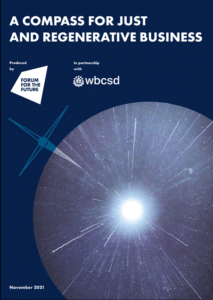As we digest the agreements reached at COP26, many of us will wonder ‘what’s next?’. Lots of delivery and accountability of course. But also, we’ll need a bigger stretch, not just to avoid catastrophe but to truly build a more hopeful future. And this, in turn, will require a different way of working, living, and valuing life.
At Forum, we have been exploring and embracing this ‘next edge’ of sustainability. We frame our vision as a ‘just and regenerative future’. And today, we are launching a tool to help businesses re-orient towards exactly that: A Compass for Just and Regenerative Business.
While we absolutely recognise that net zero is urgently needed, the report challenges businesses to look beyond it. Adopting a just and regenerative approach means embracing the power of nature to renew and regenerate, understanding that humans are a fundamental part of nature, and respecting and truly investing in everyone’s universal rights and potential to thrive.

A just and regenerative future is not a fixed destination – it’s about how we work and what we value. But we’ll know we are getting there when we have an economy that sustains the wellbeing of all, natural systems with capacity to replenish, and all people and communities have capacity to reach and stretch their potential.
Bridging theory and practice
Terminology around regeneration and social justice are gaining traction in the business sustainability sphere. But there has been no clear definition of what they mean in practice, there’s ambiguity around the business case for change and confusion on what actions can be taken to get there. Our new report aims to fill this gap by:
- Setting out a robust definition of what being just and regenerative means for businesses
- Sharing a Business Transformation Compass as a navigation guide for the transformation needed
- Providing specific recommendations to apply this new approach to key sustainable development issues (such as climate, land, human rights) and business functions (such as procurement, marketing, corporate affairs).
It has been created in partnership with the World Business Council for Sustainable Development and is based in part on insights from leading organisations such as the American Sustainable Business Council, Unilever, Nestlé, Ingka Group (IKEA), Kimberly-Clark, Seventh Generation, SIG and Capgemini.
I’m excited about this work for three reasons.
- It brings the latest thinking about social justice and regeneration together, something that is vital but still surprisingly rare.
- It doesn’t just prescribe this or that action in a list that will soon out-date, but focuses on the ‘mindset’ that enables a different approach to decision-making. It even helps players to identify the current mindset prevailing in their company, such as ‘risk mitigation’ or ‘do no harm’.
- And finally, it is challenging, a bit uncomfortable at times, but it is trying to provide that navigation between where we are today and a fundamentally different model, with different values and outcomes. It is practical in digging into business functions, and stretching in challenging how they are applied.
If you are wondering how we get off the trajectory of ‘business as usual with a bit less harm’, if you are wrestling with how to apply a more transformative lens to the practical things of post-COP priorities, then delve in, challenge yourself and your colleagues and let us know what you think.










